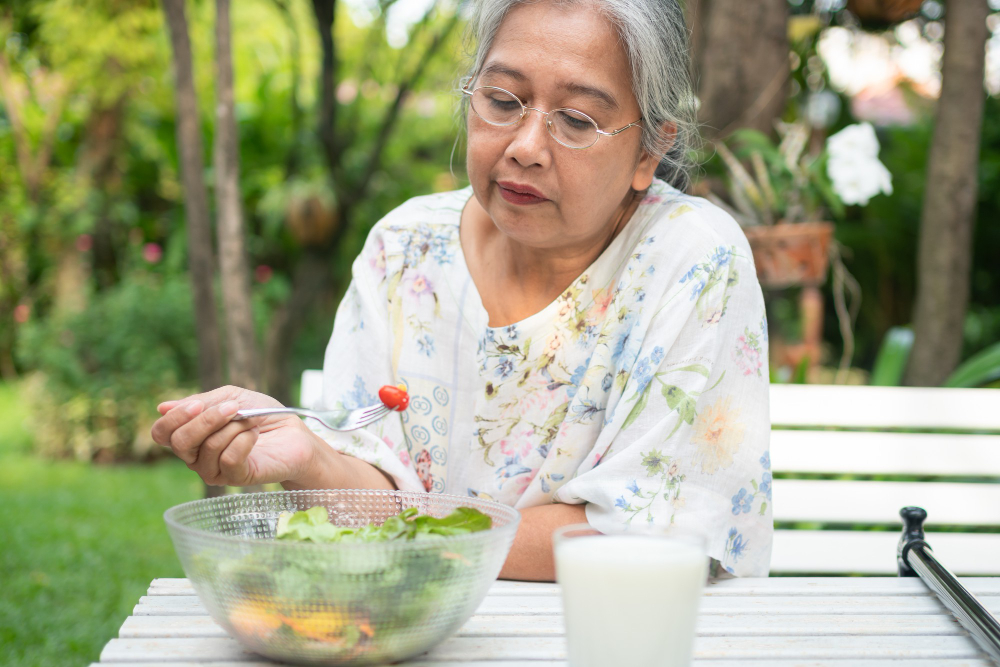
Tips for Seniors to Maintain Healthy Eating Habits
Incorporating various nutritious foods into daily meals is crucial for people of all ages. However, older adults, who may be more vulnerable to health issues and body changes, must focus on their diet to stay active and healthy. Healthy eating is often associated with calorie restriction and weight loss, but it is much more than that. Maintaining a well-balanced diet is paramount to promoting optimal physical and mental health. It not only supplies essential nutrients for the body’s functions but also has a significant effect on brain function and emotional health.
So, what should older adults include in their meals to stay active, energized, and healthy? How can caregivers help ensure the adults they care for get the necessary nutrients? Which foods should be emphasized or limited?
Promoting Public Health with the Dietary Guidelines for Americans
The United States Department of Agriculture (USDA) has developed a comprehensive guide known as the Dietary Guidelines for Americans to promote public health. This essential resource is a wealth of information on healthy eating, suitable for individuals of all ages. Older adults can also find helpful meal-planning tips, nutrition information, and recommendations on the USDA website called MyPlate. By following these resources, seniors can make informed choices and prioritize their health through nutrition. Please keep reading to discover practical tips and suggestions on how older adults can incorporate healthy food choices into their daily lives.
Create Diverse Meal Plans that Include a Range of Food Groups
A healthy diet forms the basis for overall well-being. It starts by adopting a balanced eating plan that incorporates a variety of nutritious foods. These foods, including vegetables, fruits, grains, proteins, and dairy or soy alternatives, are categorized into different groups. Each group offers a distinct combination of essential nutrients contributing to optimal bodily functions.
Although having a diverse range of nutrient-rich foods in one’s diet is crucial, seeking guidance from a qualified dietary advisor is equally important. These professionals can offer valuable guidance on necessary nutrient intake and provide insights into special considerations.
Choose Healthy Snacks for Seniors
As a caregiver for seniors, it’s essential to incorporate healthy snacks into their daily routine. Snacking on nutritious foods can help stabilize blood sugar, prevent overeating, and keep energy levels high throughout the day.
Here are some delicious and healthy snack options that you can consider:
- Veggies with Hummus: Carrots, celery, or cucumber sticks paired with various hummus flavors make for a satisfying and nutritious snack. Hummus is a good source of protein and fiber, and vegetables provide essential vitamins and minerals.
- Citrus Fruits: Sliced oranges, tangerines, and grapefruits offer a refreshing flavor boost. These citrus fruits are delicious and packed with vitamin C and antioxidants. Sliced citrus fruits can help support a healthy immune system with their high vitamin C . Antioxidants in these fruits may help protect against cell damage caused by harmful free radicals. These fruits can help boost immunity and fight off infections, which is especially beneficial for seniors.
- Unsalted Nuts: Heart-healthy options include almonds, cashews, walnuts, and pistachios. Options that provide a variety of nutrients, along with healthy fats and protein. Best of all, they are an easy and convenient snack that requires no preparation and can stay fresh for extended periods.
- Cottage Cheese: For a nutritious and satisfying snack, try cottage cheese! It is an excellent source of protein and calcium and also pairs well with whole-grain crackers for added filling power. Consider adding a spoonful of jam or berries to elevate the flavor and nutrient content.
- Smoothies: Smoothies are a fantastic way to combine fresh fruits and yogurt into one delicious snack. You can also sneak in some nutritious add-ins like spinach, avocado, protein powder, or wheat germ to boost the nutritional value.
Dining is Always More Enjoyable When You’re in the Company of Others
Eating with others is not only a way to enjoy your meals, but it can also make the entire process of planning and cooking less exhausting. If you find that preparing meals has become a chore, consider the benefits of eating in good company.
One excellent option is to organize occasional potluck meals with friends or family. This way, everyone can contribute one part of the meal, making cooking easier for seniors and creating an enjoyable mealtime experience. Sharing the meal preparation responsibilities lightens the load and fosters a sense of togetherness and community.
Additionally, consider exploring dining options at your area’s senior centers, community centers, or religious facilities. At these establishments, you can frequently find complimentary or affordable meals that allow you to savor a delightful culinary experience while engaging in social interactions with fellow diners. Not only will you have access to nutritional meals, but you’ll also have the opportunity to meet new people and build connections.
Importance of Hydration for Older Adults
Older adults must stay adequately hydrated as they might not always notice when thirsty, making them vulnerable to dehydration even in cooler weather. Caregivers should take charge and ensure that the seniors they look after regularly consume fluids. It would be best if elderly individuals consume at least eight 8-ounce water glasses during the day. While it is not advisable to rely on sugary drinks, seniors can diversify their fluid intake by opting for natural juices, tea, soup, or consuming water-rich fruits and vegetables like fresh watermelon or cucumbers.
Try to Stay Away From Food Which is Unhealthy for You
It is always important to prioritize food that is good for one’s well-being, and this means avoiding those that have a negative impact, no matter how convenient, pleasurable, or budget-friendly they may seem. This is especially important for older adults who are more susceptible to the following:
- Alcohol overconsumption can potentially reduce brain volume, disturb the function of neurotransmitters, and result in various behavioral changes. Additionally, it can potentially decrease cognitive function, including memory loss, and disrupt standard sleep patterns.
- Mercury in wild seafood can contaminate fish and negatively impact those who ingest it. Mercury toxicity can harm the brain, kidneys, and liver and disrupt the central nervous system.
- Consuming refined carbohydrates such as white flour or sugar can result in a rapid increase in both blood sugar and insulin levels. A medical journal called “Nutrients” published a study that showed that high glycemic overload can impair memory and increase the risk of Alzheimer’s and dementia.
- Trans fats, commonly found in pre-packaged foods, frosting, margarine, shortening, and snack foods, can potentially impact the brain negatively. Conversely, it has been discovered that natural unsaturated fats in dairy and meat do not have any harmful effects. Extensive research has shown that consuming artificial trans fats can significantly increase the risk of developing Alzheimer’s disease, experiencing cognitive decline, reducing brain volume, and impairing memory abilities.
Tackling a Lack of Appetite in Older Adults
As adults age, their bodies undergo changes that may decrease appetite. This can result in them feeling full sooner than they used to and less motivated to eat proper, filling meals. Additionally, certain medications can have side effects, including a lack of appetite. In these cases, seniors must discuss alternative medication options with their doctors to help address this issue.
To encourage appetite in older adults, caregivers can try various approaches to make food more appealing. One strategy is incorporating various flavors, textures, and colors into each meal. Visiting a local supermarket can help discover seasonal vegetables, fruits, or seafood options that haven’t been eaten or are available in a while. It’s also worth trying alternative cooking methods, such as steaming vegetables instead of broiling them, as this can help maintain their crunch and provide variety in terms of texture.
In addition to these dietary adjustments, older adults must stay physically active. Regular physical activity not only aids in calorie burning but also stimulates appetite, which can motivate older individuals to make the most of designated meal times. By engaging in routine physical activity, older adults can boost their appetite and maintain a healthy eating routine.
Learn About Senior Food Programs
Under programs like the Older Americans Act and Meals on Wheels, seniors can access local resources that promote healthy eating and make meal preparation easier. These programs offer group and home-delivered meal options to ensure seniors can access healthy meals quickly.
We have compiled practical tips and helpful resources to encourage seniors and their caregivers to incorporate healthy food choices into their daily lives. Focusing more on nutritious eating and putting in extra effort can make healthy eating less daunting and more enjoyable.
Welcome to Bena Home Care, where we pride ourselves on providing exceptional care to families like yours. Our dedicated squad is comprised of compassionate and highly skilled personal caregivers, registered nurses, and home health aides who are committed to making a difference in the lives of our clients. With Bena Home Care, you can be confident that your loved ones are in capable hands. Our team is trained to provide expert care and support tailored to meet the unique needs of each individual we serve. We understand that every family is different, which is why we strive to create personalized care plans that truly prioritize the well-being of our clients.
At Bena Home Care, we believe self-care is essential to providing the best care for others. We encourage you to prioritize your own well-being because we understand that if you are not taking care of yourself, it becomes a challenge to provide the level of care your loved ones need and deserve. Our team is here to support you every step of the way, ensuring that your well-being is also a top priority. We invite you to connect with us at Bena Home Care today and experience the difference our exceptional care can make in the lives of your loved ones. Give us a call or contact us to learn more about our services and how we can meet your unique care needs.
Remember, your well-being matters too. Together, let’s provide the quality care your family deserves.















